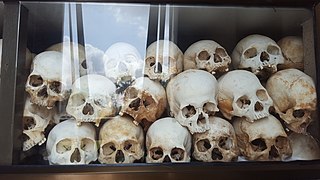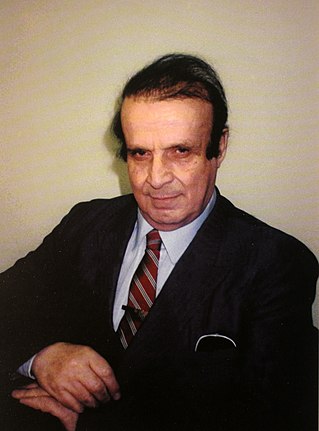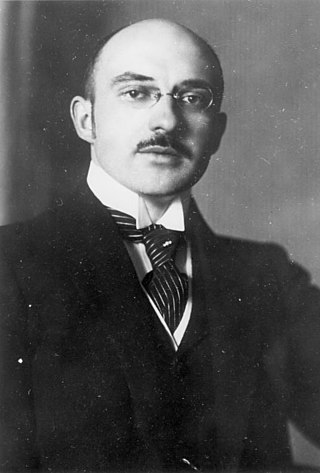Related Research Articles

Genocide is violence that targets individuals because of their membership of a group and aims at the destruction of a people.

The lion is a large cat of the genus Panthera, native to Africa and India. It has a muscular, broad-chested body; a short, rounded head; round ears; and a dark, hairy tuft at the tip of its tail. It is sexually dimorphic; adult male lions are larger than females and have a prominent mane. It is a social species, forming groups called prides. A lion's pride consists of a few adult males, related females, and cubs. Groups of female lions usually hunt together, preying mostly on medium-sized and large ungulates. The lion is an apex and keystone predator; although some lions scavenge when opportunities occur and have been known to hunt humans, lions typically do not actively seek out and prey on humans.

The Arctic Archipelago, also known as the Canadian Arctic Archipelago, is an archipelago lying to the north of the Canadian continental mainland, excluding Greenland and Iceland.

Early is a city in Sac County, Iowa, United States. The population was 587 at the 2020 census.

Cochituate is a census-designated place (CDP) in the town of Wayland in Middlesex County, Massachusetts, United States. The population was 6,927 at the 2020 census, out of 13,943 in the entire town of Wayland.

The Herero Wars were a series of colonial wars between the German Empire and the Herero people of German South West Africa. They took place between 1904 and 1908.

Vahakn Norair Dadrian was an Armenian-American sociologist and historian, born in Turkey, professor of sociology, historian, and an expert on the Armenian genocide.

Ludwig Maximilian Erwin von Scheubner-Richter was a Baltic German political activist and an influential early member of the Nazi Party.

The Greek genocide, which included the Pontic genocide, was the systematic killing of the Christian Ottoman Greek population of Anatolia, which was carried out mainly during World War I and its aftermath (1914–1922) – including the Turkish War of Independence (1919–1923) – on the basis of their religion and ethnicity. It was perpetrated by the government of the Ottoman Empire led by the Three Pashas and by the Government of the Grand National Assembly led by Mustafa Kemal Atatürk, against the indigenous Greek population of the Empire. The genocide included massacres, forced deportations involving death marches through the Syrian Desert, expulsions, summary executions, and the destruction of Eastern Orthodox cultural, historical, and religious monuments. Several hundred thousand Ottoman Greeks died during this period. Most of the refugees and survivors fled to Greece. Some, especially those in Eastern provinces, took refuge in the neighbouring Russian Empire.

Ottoman labour battalions was a form of unfree labour in the late Ottoman Empire. The term is associated with the disarmament and murder of Ottoman Armenian soldiers during World War I, of Ottoman Greeks during the Greek genocide in the Ottoman Empire and also during the Turkish War of Independence.
The Journal of Genocide Research is a quarterly peer-reviewed academic journal covering studies of genocide. Established in 1999, for the first six years it was not peer-reviewed. Since December 2005, it is the official journal of the International Network of Genocide Scholars. Previous editors have been Henry R. Huttenbach, Dominik J. Schaller, and Jürgen Zimmerer. The journal is abstracted and indexed in Political Science Abstracts, Historical Abstracts, and America: History and Life. As of 2022, the journal is published by Routledge and the editor-in-chief is A. Dirk Moses.

The Kalinago genocide was the genocidal massacre of an estimated 2,000 Kalinago people by English and French settlers on the island of Saint Kitts in 1626.
Genocide definitions include many scholarly and international legal definitions of genocide, a word coined by Raphael Lemkin in 1944. The word is a compound of the ancient Greek word γένος and the Latin word caedō ("kill"). While there are various definitions of the term, almost all international bodies of law officially adjudicate the crime of genocide pursuant to the Convention on the Prevention and Punishment of the Crime of Genocide (CPPCG).
Mark Schaller is an American psychological scientist who has made many contributions to the study of human psychology, particularly in areas of social cognition, stereotyping, evolutionary psychology, and cultural psychology. He is a professor of psychology at the University of British Columbia.

Vahan Papazian, also known by his pseudonym Goms (Կոմս) was an Armenian medical doctor, politician, political activist who was one of the leaders of the Armenian national liberation movement. He was the younger brother of Vrtanes Papazian.

Baron Édouard Eugène François Descamps (1847–1933) was a Belgian jurist and politician who was known as a contributor to international law.

The late Ottoman genocides is a historiographical theory which sees the concurrent Armenian, Greek, and Assyrian genocides that occurred during the 1910s–1920s as parts of a single event rather than separate events, which were initiated by the Young Turks. Although some sources, including The Thirty-Year Genocide (2019) written by the historians Benny Morris and Dror Ze'evi, characterize this event as a genocide of Christians, others such as those written by the historians Dominik J. Schaller and Jürgen Zimmerer contend that such an approach "ignores the Young Turks' massive violence against non-Christians", in particular against Muslim Kurds.
The deportations of Kurds by Turkey refers to the population transfer of hundreds of thousands of Kurds from Turkish Kurdistan that was perpetuated by the Ottoman Empire and its successor Turkey in order to Turkify the region. Most of the Kurds who were deported were forced to leave their autochthonous lands, but the deportations also included the forced sedentarization of Kurdish tribes. Turkish historian İsmail Beşikçi emphasized the influence of fascism on these policies, and Italian historian Giulio Sappeli argued: "The ideals of Kemal Atatürk meant that war against the Kurds was always seen as an historical mission aimed at affirming the superiority of being Turkish." Occurring just after the Armenian genocide, many Kurds believed that they would share the same fate as the Armenians. Historians Dominik J. Schaller and Jürgen Zimmerer state that this event "not only serves as a reminder of the unsettling fact that victims could become perpetrators, but also that perpetrators [as some Kurds were during the Armenian Genocide] could turn victims".

The relationship between the Armenian genocide and the Holocaust has been discussed by scholars. The majority of scholars believe that there is a direct causal relationship between the Armenian genocide and the Holocaust, however, some of them do not believe that there is a direct causal relationship between the two genocides.
Hilmar Kaiser is a German historian who has a PhD from European University Institute, Florence, and works at Yerevan State University.
References
- ↑ Schaller, Dominik J. (2007). "From the Editors: Judges and Politicians as Historians?". Journal of Genocide Research. 9 (1): 1–4. doi: 10.1080/14623520601162881 . S2CID 71844425.